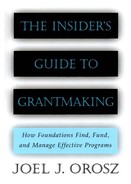A Grantseeker's Bill of Rights
A straightforward way to systematize this kind of “right behavior” for program officers is to draw up a bill of rights for grantseekers. A number of attempts have been made over the years to do just that, with the number of grantseekers' rights ranging from less than ten to more than twenty. The list that follows takes into consideration its predecessors (most of which, over the years, have been published in Foundation News and Commentary) and adds a few new twists. My choice of offering ten rights is a deliberate one. Not only is this pleasing historically, but my aim is to present a concise statement of the most important things that all program officers should honor in their dealings with applicants:
- The right to receive a clear statement of the foundation's funding interests
- The right to have all communications answered
- The right to an explanation of, and timeline for, the foundation's proposal review process
- The right to a prompt acknowledgment of receipt of a proposal
- The right to have all proposals read in full and seriously considered
- The right to a timely and unambiguous funding decision
- The right to receive an explanation of the reasoning behind funding decisions
- The right to have all requirements for the grant relationship clearly spelled out, in writing (including the right to have any components of the grant required by the foundation paid for by the foundation)
- The right to have all reports completely read and carefully considered
- The right to be informed if continued funding is a possibility
For the most part, with apologies to Mr. Jefferson, these truths certainly are self-evident, but this does not mean that they are universally honored. In fact, many foundations fall short of completely respecting this bill of rights. For example, there are still a number (a minority to be sure, but a significant minority) of foundations that publish neither an annual report nor a brochure explaining their programming interests. Grantseekers are thus forced to do considerable detective work before they can even determine whether the foundation might be interested in receiving a proposal. This is a waste of their time and resources, and it could easily be prevented by the issuance of a simple brochure.
The third right is often violated by review processes that are shrouded in as much mystery as the fate of Amelia Earhart. Such foundations seem determined to appear as a black box, in which proposals are inserted at one end, and grants—or more likely, rejection letters—emerge at the other end in a totally inexplicable fashion. A foundation need not share every detail of the grantmaking process, but an explanation of its broad outlines and an estimate of its likely duration would be of significant help to the grantseeker. Unfortunately, even something as simple and painless as acknowledging receipt of proposals by return mail is not universally practiced.
Perhaps the most inexcusable lapse occurs when foundations require a certain component as a condition for receiving a grant but refuse to cover its cost. This is the moral equivalent of the unfunded mandate in government. Some foundations are notorious for requiring, for example, that projects they fund be evaluated by a third party—but they are unwilling to pay for evaluation. Foundations should require nothing unless they are willing to pay (at a minimum) the lion's share of the costs for the requirement.
Living up to the bill of rights outlined here is an essential element of professional practice for any foundation, and not an onerous task. All that is needed is a commitment to open and honest communications with the public. Any foundation that aspires to a professional level of operations—or that simply values its integrity—should not find it difficult to comply with these ten rules.
